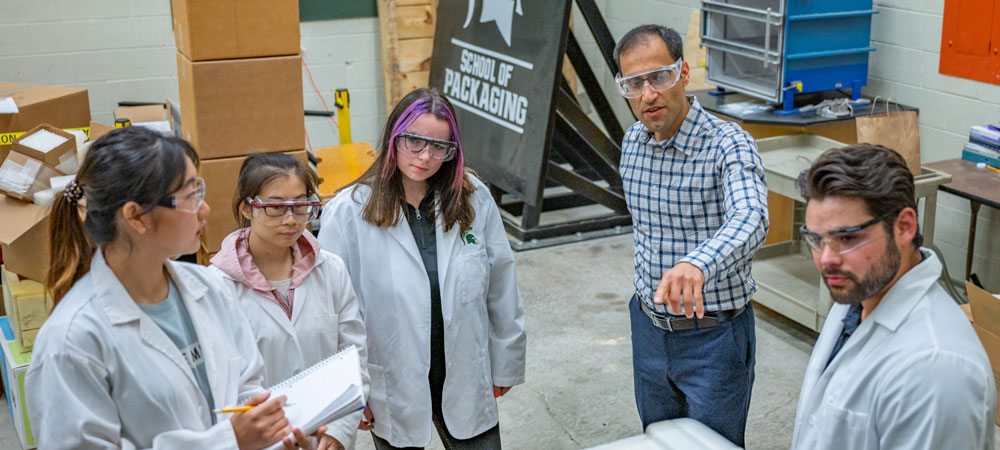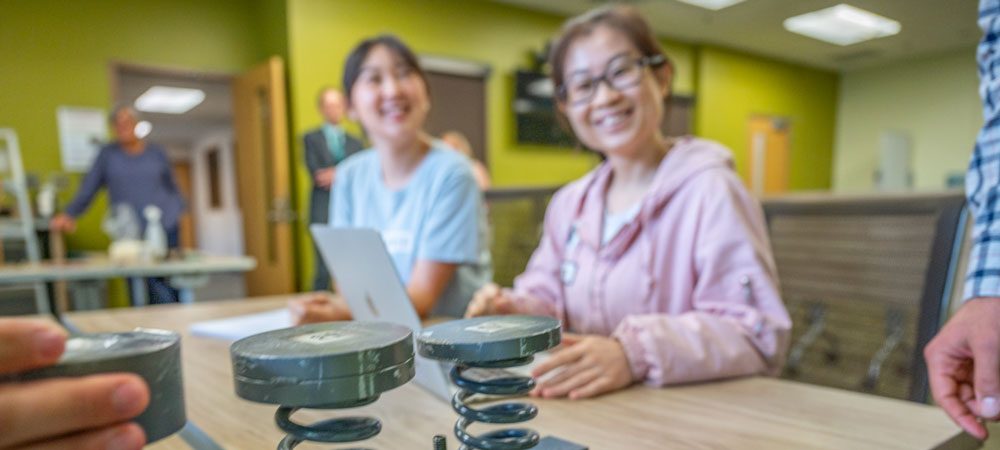MSU School of Packaging director: Our partnership with Amcor will inspire packaging leaders
Innovation
August 10, 2021Reading time: 4 minutes
Following our recent announcement, we sat down with Matthew Daum Ph.D., Director of Michigan University’s School of Packaging to understand how this partnership will make a difference.
Following our recent announcement, we sat down with Matthew Daum Ph.D., Director of Michigan University’s School of Packaging to understand how this partnership will make a difference.

Q. What does this partnership mean for the School of Packaging?
At this critical moment in the school's history, the Amcor partnership will be a catalyst for accelerating research and teaching in the area of sustainable packaging solutions.
Both parties strive for data-driven packaging solutions and a shared emphasis on excellence in all that we undertake. Like Amcor, MSU is committed to innovating more sustainable packaging solutions that consider the whole value chain, from raw material all the way through to end of use. The School of Packaging teaches from a material-neutral perspective because we are focusing on the larger issue of scalable solutions that minimize total environmental impact. We want our students and the research we undertake to make long-term positive societal impact, and Amcor shares that objective.
More specifically, this partnership with Amcor allows us to begin renovating our facilities to create a modern, collaborative environment for our students and faculty.
Additionally, the Amcor partnership also establishes an endowed chair position focusing on packaging sustainability.
Q. How will this partnership help bring your vision for the School of Packaging to life?
We want to be unquestionably the world’s best packaging program for teaching, research and community outreach. To achieve that vision, we need to modernize our facilities, invest in our faculty and graduate students, and ensure that we attract and retain a diverse student population.
The School and its supporters have dreamt about and discussed what it would take to bring modern facilities and a prestigious faculty position to the School. The partnership with Amcor will finally make that happen.
Q. What changes are you making to the building and how will they help inspire more sustainable packaging?
The changes we are making in this Phase I renovation are a critical first step towards a longer-term vision.
Our first objective is to modernize our main classroom, the showcase space for teaching and gathering people together. The second objective is to update and add office space for our faculty and graduate students.
Third is adding new collaborative workspaces with connective technologies. This last objective is all about creating an atmosphere of innovation and inspiration for both students, faculty and in combination with partners across industry, academia, government agencies and NGOs. Our hope is that these renovations will draw the best minds to East Lansing, Mich.
Q. How will this partnership help the industry face its future challenges?
It can be easy to only focus on the challenge of wasteful packaging without also considering the many benefits packaging provides. Examples are reduced product damage through e-commerce, limited food waste, or ensuring delivery of life-saving medical products — like vaccines.
For sure there are packaging end-of-life challenges, such as a lack of recycling infrastructure, excessive material use or the use of a less optimal material type. What we need is a holistic value chain approach for solving these challenges that considers environmental impact while still reaping the benefits packaging provides. This is where partnership across suppliers, brand owners, government entities, waste management companies and packaging programs can generate innovative solutions, and especially through this collaboration.

Q. What will the focus be for the Endowed Chair of Packaging Sustainability professorship?
The Endowed Chair will focus their efforts in three key areas. The first will be innovative, sustainable packaging solutions that lower overall environmental impact; total solutions that work through the whole value chain.
The second focus is to take those new learnings from research and incorporate them into our program curriculum. This ensures our students have the most up-to-date training as part of their education.
The third component is public outreach. And when I say outreach, I’m including partnerships with industry, government entities and NGOs. The idea is to have a voice and bring a data-driven point of view to critical policy-making conversations. Outreach also means translating academic concepts and presenting them to the general population in terms that are easy to grasp and easy to implement. It’s about providing a holistic perspective on the benefits of packaging along with scalable, practical solutions for end-of-life challenges.
Q. What’s the future of the School of Packaging, where do you see the growth potential?
If you look at the packaging industry as a whole, it's close to a trillion-dollar industry. It's one of the largest global industries, and it's growing between 3% and 5% each year across most sectors.
Back in January, right in the middle of the pandemic, there were over 20,000 packaging engineering positions available online. In Amcor’s rigid packaging team alone, there are currently 3,272 full time employees just in the US. I believe that demand will continue, because companies are striving to take advantage of new technologies and develop more sustainable packaging solutions.
The COVID-19 pandemic really highlighted the benefits of packaging as well. Everything from vaccine preservation and delivery solutions to packaging that kept businesses and restaurants open during the pandemic. E-commerce is growing, medical and pharmaceutical industries are growing. All of these already are strengths for the School, and I expect that they will continue to be so, and can do it with a firm foundation in a sustainable solution curriculum.
Q. What niche does the MSU School of Packaging fill in the industry?
I would suggest that the MSU School of Packaging does more than just fill a niche. We have produced between 40% to 50% of the packaging engineers going into industry. Our graduates have tremendous leadership influence in all kinds of companies, and you'll find MSU packaging grads at all management and C-suite levels. A lot of the creative packaging you see in stores and online are developed by our graduates.
The Amcor gift reinforces our long-standing effort incorporating a sustainable design approach throughout our curriculum, which in turn further distinguishes MSU as a thought leader in this space.
And finally, I’ll mention that MSU has the only Ph.D. packaging degree in the U.S. We attract many international graduate students, many who return to their home countries to take influential public and private sector positions. So we also have global influence with our packaging education, which in turn influences the global packaging industry.
